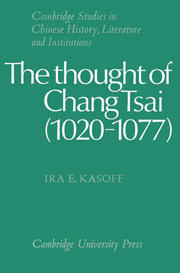Summary
This is a study of the philosophy of a brilliant and original thinker, Chang Tsai (1020–77). It is intended to be of interest both to sinologists, since there has not yet been a full-length monograph on Chang's philosophy; and also to non-specialists interested in reading something about Chinese philosophy, about what a Chinese philosopher thought about the world and man's place in it.
Although much of Chang's writings are no longer extant, enough remains to enable us to piece together a comprehensive philosophic system. His was an optimistic philosophy, asserting the basic goodness and perfectability of man. At the same time Chang accounted for the presence of evil in the world, without introducing any god-like figure or creator deity, nor any fall from grace. Chang developed a cosmology derived from traditional Chinese concepts like ch'i and yin–yang, and yet different from anything that had come before. In fact his philosophy, along with that of the rival school of his cousins Ch'eng Yi and Ch'eng Hao, marked a new departure in the history of Chinese philosophy: the beginning of the Neo-Confucian movement which was to be the dominant school of thought for centuries to come.
The thinkers associated with this movement developed complex and comprehensive philosophic systems unprecedented in Chinese history.
- Type
- Chapter
- Information
- The Thought of Chang Tsai (1020–1077) , pp. ix - xivPublisher: Cambridge University PressPrint publication year: 1984



